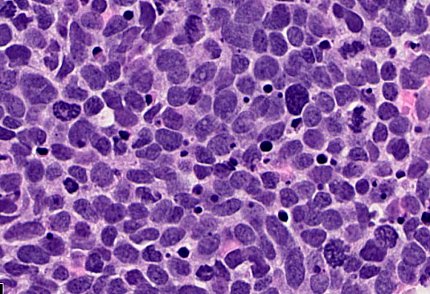Researchers Make Advances in Treating Small Cell Lung Cancer

Photo: Parth Desai/NCI
NIH researchers have identified and tested a drug combination that exploits a weakness in small cell lung cancer (SCLC). The scientists targeted a vulnerability in how the cancer cells reproduce, increasing already high levels of replication stress—a hallmark of out-of-control cell growth in many cancers that can damage DNA and force cancer cells to constantly work to repair themselves. In a small clinical trial, the drug duo shrank the tumors of SCLC patients. The team reported its findings in Cancer Cell.
While many patients with SCLC initially respond to chemotherapy, they usually live a matter of weeks after their first treatment stops working and this aggressive cancer returns. Scientists at NCI and NCATS teamed up to find another option.
The NCI group explored the potential of nearly 3,000 agents from an oncology-focused library of investigational and approved drugs against SCLC cells. NCATS’s robotics-enabled, high-throughput screening technologies allow scientists to rapidly test thousands of different drugs and drug combinations. Scientists can examine the most promising drugs and drug combinations, determine effective dosing and learn more about the possible drug interactions.
The research team found multiple combinations involving commonly used chemotherapy drugs that cause DNA damage and drugs designed to block DNA repair. One of the most effective combinations was FDA-approved chemotherapy drug topotecan and an investigational drug M6620, or berzosertib, which blocks an enzyme, called ATR, that plays a role in DNA repair.
“Blocking the ATR enzyme means cancer cells can’t respond to DNA damaging agents properly,” said NCATS translational scientist Dr. Michele Ceribelli, co-author of the study. “This makes chemotherapy even more effective.”
The NCI researchers tested the berzosertib-topotecan drug combination in a clinical trial involving SCLC patients who either had relapsed after initial treatment or for whom their therapy had stopped working. They found the drug combination helped more than one-third of participants (9 of 25) improve in some way. In some cases, the improvement lasted for 6 months.
The findings suggest that researchers could develop a more personalized approach in treating SCLC as well as other types of small cell neuroendocrine cancers. As a next step, NCI is sponsoring a larger clinical trial to compare the effects of berzosertib and topotecan in combination against topotecan alone in SCLC patients.
